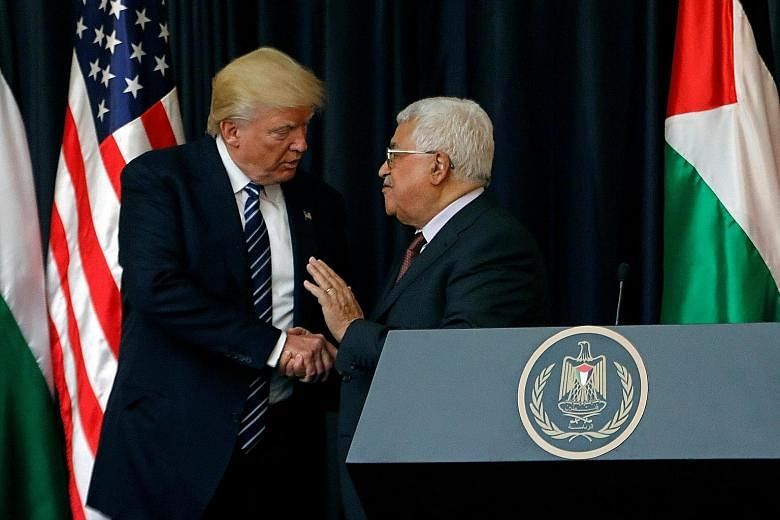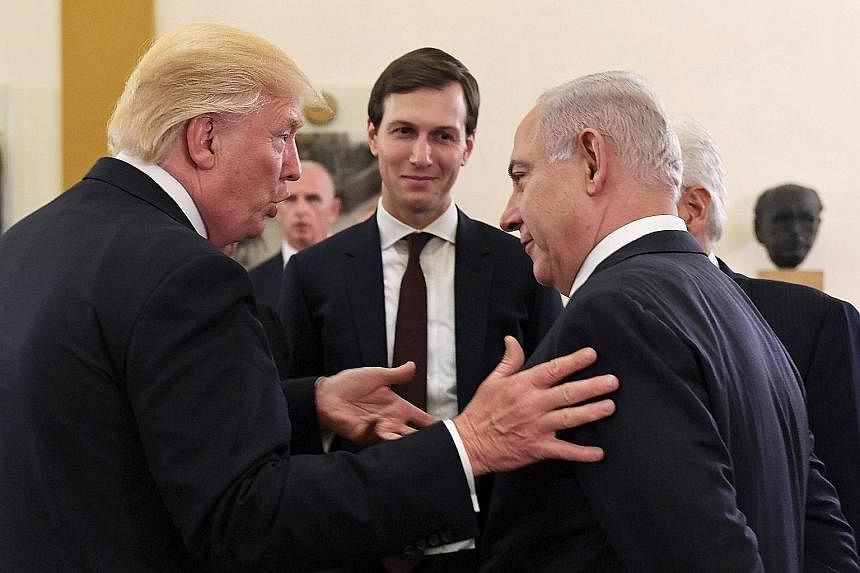JERUSALEM • United States President Donald Trump has called on Israelis and Palestinians to make compromises that could lead to peace as he wrapped up a visit with a speech in Jerusalem.
"Making peace, however, will not be easy," Mr Trump told an audience of Israeli politicians and other dignitaries at the Israel Museum yesterday.
"We all know that. Both sides will face tough decisions. But with determination, compromise and the belief that peace is possible, Israelis and Palestinians can make a deal."
Mr Trump again vowed that he was "personally committed" to helping the two sides reach a deal to end the decades-old conflict. He, however, offered no specifics on how he planned to make progress in resolving a conflict that has bedevilled his predecessors and with widespread scepticism over whether meaningful talks are possible for now.
He did not specifically mention the two-state solution, long the focus of international peace efforts and US Middle-East diplomacy.
Other parts of the speech included pledges to defend Israel against common enemies, including Iran.
Mr Trump's speech came after he met Palestinian President Mahmoud Abbas in Bethlehem in the occupied West Bank earlier in the day and held a private meeting, during which they discussed the now- stalled peace process.
Mr Abbas said he welcomed Mr Trump's efforts, which had "given all the nations across the region so much hope and optimism of the possibility of making a dream come true".
"Our commitment is to cooperate with you in order to make peace and forge a historic peace deal with the Israelis," he added.
But while Mr Trump spoke in generalities about the goal, Mr Abbas laid out the specifics of Palestinian demands - which all have been supported by the Arabs and rejected by Israel through decades of unsuccessful peace negotiations shepherded by American presidents.
"We reassert to you our positions of a two-state solution along the borders of 1967, a state of Palestine with its capital in East Jerusalem, living alongside Israel," he said, referring to Israel's occupation of the West Bank following a war against three Arab armies.
Israel claims Jerusalem as its capital, but Palestinians insist that the city's mostly Arab eastern part be the capital of any future state.
Mr Trump has appointed his son-in-law Jared Kushner as a senior adviser on brokering an agreement, while Mr Jason Greenblatt, formerly a lawyer in Mr Trump's real estate group, has taken the day-to-day role of liaising with officials and leaders in the region on the nitty-gritty contours of any solution.
The last talks between the Israelis and Palestinians, led by former US Secretary of State John Kerry, broke down in April 2014 after about a year of largely fruitless discussion.
While both Mr Netanyahu and Mr Abbas have made positive noises about their readiness to negotiate, both also face domestic constraints on their freedom to manoeuvre and strike a deal.
Mr Netanyahu must deal with opposition from rightist elements within his coalition who oppose any steps towards a two-state solution to the decades-long conflict.
Mr Abbas' Fatah party is at sharp odds with Islamist group Hamas, which is in power in the Palestinian enclave of Gaza, leaving no unified Palestinian position on peace.
One of the longstanding regional proposals is a Saudi peace initiative that was first put forward in 2002 and has been re-endorsed several times since.
In effect, it would offer Israel recognition by the Arab world and the "normalisation" of relations in exchange for a full withdrawal from the territory Israel has occupied since the June 1967 Middle-East war, including East Jerusalem. It also urges a "just settlement" of the Palestinian refugee problem.
Mr Netanyahu has expressed tentative support for parts of the initiative, but there are many caveats on the Israeli side, including how to resolve the ever more complex refugee issue and whether Israel would withdraw from the Golan Heights, strategic territory that Israel took from Syria in the 1967 war.
Dr Husam Zomlot, a former adviser to Mr Abbas and now the Palestinian ambassador in Washington, said the contours of any deal between the Israelis and the Palestinians were well known to both sides. If negotiations were to resume, they needed to be about the core issues, not talks about talks, he said.
"President Trump is really, really serious and he thinks peace is possible. It is not easy, but we agree with him - peace is possible. All the stars are aligned," he said. "We are ready. Everything is ready."
After Israel and the Palestinian territories, Mr Trump will head to the Vatican, and to Brussels and Italy for Nato and G-7 meetings.
AGENCE FRANCE-PRESSE, WASHINGTON POST, REUTERS
SEE WORLD & OPINION:


